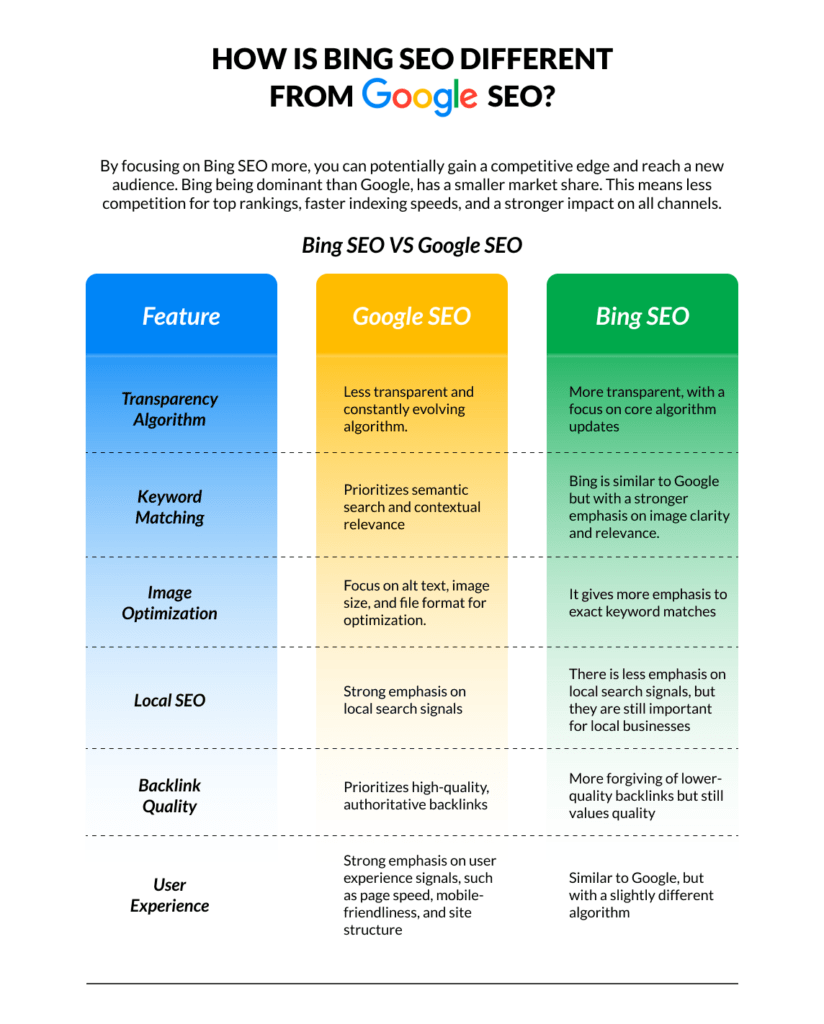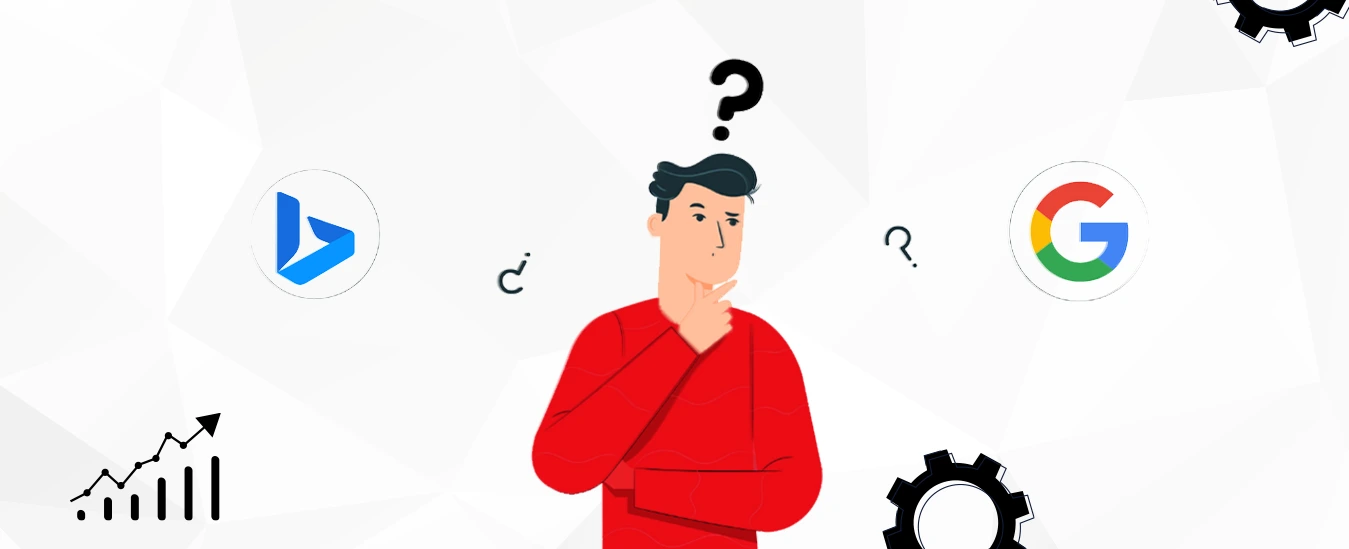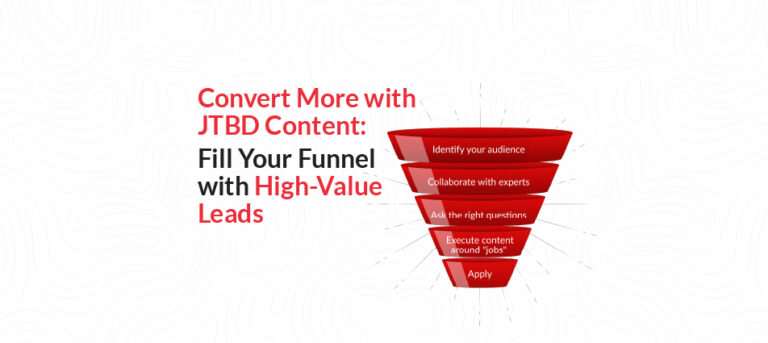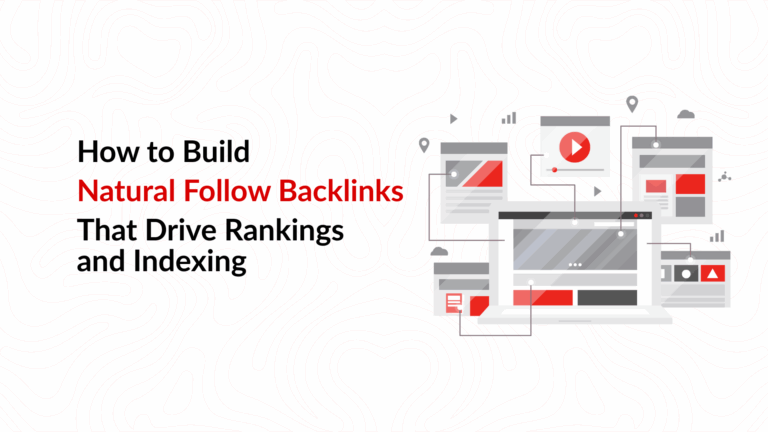Bing vs Google SEO: Which one Dominates and How to Optimize it for Both

Any business wants to thrive in this dynamic landscape of digital marketing; hence, knowing the dynamics behind search engine optimization is important. While Google and Bing are the two biggest players in the search market, with an entirely different approach. Marketers have to optimize their websites. Although Google dominates the search market, in terms of gaining a competitive advantage.
This article will cover the differences between Bing and Google SEO, keeping website health up to date with the subtle variances in their optimisation. Whether a newcomer to the world of SEO or an experienced marketer, the insights here will assist in tailoring strategies that could improve visibility and ranking on both Bing and Google.
Overview of Bing and Google’s significance in search engine optimisation
Each search engine has its strengths, and one must know them while preparing an SEO strategy. Google algorithms focus more on the keyword intent of the user; hence, contextual relevance and content depth often become a point of focus. Bing, on the other hand, is a traditionalist regarding SEO methods that include exact-match keywords and proper site structure. Thus, to cover both grounds properly, one must know them both.
Bing V/S Google SEO Optimization: Tips for Success
The web optimization strategies of your website on both Bing and Google cover major factors that will boost your rankings on the two platforms.
Focus on Exact Match Keywords
Bing is more oriented to exact match keywords than Google, which seems to be more focused on semantically relevant keywords. This results in using the primary keyword at the title tag, header, and throughout the content, which has a more significant ranking impact for Bing. This is not true for Google; its algorithm cares less about the keyword density and more about how relevant the content is.
Use of Structured Data for Better Ranking
This way, the search engine, both Google and Bing, understands your content easily with schema markup. Though Google has long optimized the capacity of its parsers and displays of rich snippets in its improvement, the case is not exempted from Bing. This way, applying schema markup in search engines offers more exposure to your content so that it can reach out to more people while creating a better experience for the users.
Key Differences and Ranking Factors in Bing SEO vs Google SEO
Understanding of how Bing and Google rank pages is important to maintain SEO on these two platforms. Below, we compare ranking factors that have had more impact on each of the platforms.
Transparency in Algorithms
Google: Not so revealing about the mechanisms of the algorithms, Google tends to change ranking factors without prior warning to marketers. Its webmaster tools and many other updates give somewhat of a view into its ranking factors.
Bing: On the other hand, Bing is pretty transparent about algorithms and updates. With clearer direction on ranking factors, Bing’s algorithm is not as difficult to navigate and gives companies a clear picture of what must be improved.
Keyword Matching and Optimization
Google: The near future of the Google algorithm is sure to emphasise more intention with the help of semantic search. The reason behind that is, therefore. Generally, better semantic accuracy with contextual relevance has been good in Google thanks to the helping hand of Artificial Intelligence, Natural Language Processing, and Machine Learning.
Bing: The keyword match is considered more important than the contextual match by Bing. That is if your keyword is used in the title, URL, and meta description, in that order, content from your webpage would rank better for Bing.
Image and Visual Content Optimization
Google: Google provides image optimization value but focuses mainly on alt text, file size, and general performance while searching. Google is good at optimising images in terms of both speed and relevance.
Bing: Bing focuses more on the quality and attractiveness of images and videos. More visually appealing, crisp, and relevant visual content will rank higher in Bing’s results, especially for media-intensive queries.
Local SEO Signals
Google: Google provides local SEO with Google Maps integration, thereby providing an extensively deep local search experience. People who are looking to find service providers nearby prefer Google. Google uses smart search features and tools like
Google Business Profile to produce the best options at any location based on reviews and relevance. This will lead a user to find trusted services close to them, and businesses get more chances of being seen.

Bing: Although Bing does provide local results, the attention to local SEO is nowhere near Google. The richness of local SEO signals is also not the same, and therefore businesses are unlikely to experience similar results on Bing for local searches that they do on Google.

Backlink Quality and Authority
Google: Google favours good quality backlinks that arise from reliable sources. Google’s algorithm treats backlinks to be one of the most influencing factors for ranking. It punishes spammy and low quality links.
Bing: Bing is relatively mild to backlinks. Though it likes good quality backlinks, it’s relatively lenient on websites that may not possess so many good quality links yet have an authority level to a certain extent.
Social Signals in SEO
Google: Social signals have no basis on Google ranking. Social sites are crowded, but Google doesn’t care about social networks, “how many are on the site so they will click like, comment, share. as a consideration for ranking,
Bing: Bing values it more with the social signals. The moment a page has received more social networking engagement and interaction, it’ll rank higher at Bing
User Experience Factors
Google: Google has emphasized speed, mobile responsiveness, and usability the most. With respect to ranking this website on Google, scores from Core Web Vitals have much more significance.
Bing: Bing is maintaining an equilibrium in usability, but in this case, conditions are less critical than that of Google in order to achieve a smoother experience. Bing has a faster loading time, easier to navigate, and offers better rankings.
SEO Bing vs Google: Pros and Cons
Both search engines have pros and cons for marketer aligning SEO campaign. Let’s decipher the pros of optimization for Bing and Google alike:
Pros of SEO in Bing
- Keywords and queries, lesser competition in it.
- Greater user diversity. The chances to target a new industry, as it may reach a travel user, entertainment or even e-commerce user.
- With social signals on the focus of the optimization of brands with lively social media pages.
Cons of SEO on Bing
- It has a very small market share compared to Google.
- Fewer resources for advertising and digital marketing purposes compared to the massive Google system.
Pros of SEO in Google
- Most extensive audience base and widest possible reach.
- Google system uses very advanced algorithms and machine learning, which help better understand what the users are looking for. It also focuses much more on user intent, meaning trying to figure out the exact purpose behind a search. This is what makes results more accurate and relevant. It learns and gets better over time, providing ever more refined and helpful answers to users.
- A very effective advertisement platform (Google Ads) and has many more targeting options
Cons of SEO in Google
- Competition is very high and cannot be met by a new or small business.
- The algorithm is always changing and tough to keep up with.
How Many People Use Bing vs. Google?
Google is the largest shareholder of search engines, with close to 92% of the global market share. Bing retains the minor share and takes only 2-3% of global market share. While Google leads the market, Bing’s AI features and its integration with platforms like LinkedIn make it useful for specific types of searches.
Conclusion: Bing versus Google – Which is Right for Your Business?
The end is to concentrate on either Bing or Google SEO, but this choice will be determined by your target market and business objectives. Google has completely dominated search volume and market share, with their powerful ecosystem serving nearly every kind of business, though they have quickly adapted to the evolution of features like AI in search. Bing has very forgiving algorithms, so the company can continue with traditional SEO techniques.
All makes perfect sense, particularly for wide-ranging global markets; however, with regard to targeting industries or demographics, it’s worth saying SEO companies might be finding Bing much more specific for this purpose and worth remembering here as well: the best strategy would require an optimization on both sides so that your business ranked well on both Bing and Google.
With this, businesses will be able to tap their digital presence, drive more traffic to the website, and consequently do better in the highly competitive online marketplace. As it ranges from Bing’s focus on exact-match keywords to Google’s focus on user intent, knowing these differences and strategically optimizing for both will give your business a huge advantage in terms of SEO.














